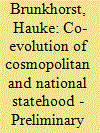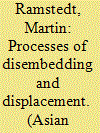| Srl | Item |
| 1 |
ID:
111913


|
|
|
|
|
| Publication |
2012.
|
| Summary/Abstract |
Although the law has always been a major reference point in the conduct of war, little scholarly attention has focused on the transformative effect of recent legal challenges, judicial rulings and inquiries on the armed forces themselves, notably the 2011 Gage Inquiry into the death of Baha Mousa and the Philip Inquiry into the Mull of Kintyre helicopter disaster. Despite this, the impact has been significant in the ways it has transformed the governance regime of British armed forces and the professional autonomy of the military. This article conceptualizes the impact of law on the armed forces as 'juridification'. In applying this concept, this article analyses the implications of this for the culture, conduct and organization of the British armed forces. It argues that juridification closes a civil-military relations gap between society on the one hand and the armed forces on the other. As important, juridification also brings with it permanent instability because of the inevitable conflicts that arise from the replacement of an old order based on authority, to a new military system based on rights. Thus the effects of juridification are not just a liminal moment-a transitory dislocation from established structures and the reversal of existing hierarchies-followed by the creation of a permanent new order. Rather, juridification has initiated an era of instability that is characterized by the absence of any permanent settlement of authority and rights in the governance of the armed forces. This has significant implications for the armed forces and their professional autonomy and the social, political and legal context in which armed forces have to operate.
|
|
|
|
|
|
|
|
|
|
|
|
|
|
|
|
| 2 |
ID:
113730


|
|
|
|
|
| Publication |
2012.
|
| Summary/Abstract |
The article claims that we should not just look towards a utopian future in fulfilling a claim about realization of a cosmopolitan, non-national world order. Already during antiquity the idea of a transcendent universal order took on a differentiated form at the same time as there happened to be institutionalization. Since the legal revolution of the long 12th century, this duality has been constitutional and has had a hierarchical structure. However, not only was the invention legal, it was also organizational; hence, the modern political, legal and organizational powers emerged long before the more celebrated state-building processes of the 16th and 17th centuries. The point is that the order was both political and cosmopolitan, institutional and universal. The nation-state was an exception compared with this long and widespread legacy of cosmopolitan power. But the universality of subjective rights was re-institutionalized according to principles that excluded inequalities. This was set in motion even before the UN Charter, not just with the ideas of 1789 but also institutionalized in Roosevelt's New Deal together with the social and political rights that were institutionalized specifically as a consequence of the World Wars and the political claims that followed.
|
|
|
|
|
|
|
|
|
|
|
|
|
|
|
|
| 3 |
ID:
114679


|
|
|
|
|
| Publication |
2012.
|
| Summary/Abstract |
This article applies Karl Polanyi's observation of a double movement of law in the history of nineteenth and early twentieth-century Europe to an analysis of Bali's integration into the global cultural economy. It describes how the increasing disembedding of the island's tourist industry from local norms and institutions, and the parallel disjuncture between Balinese religiosity and Indonesian state religion have created a condition of increasing collective anomie that has in turn provoked endeavors to juridify the Balinese religio-ethnic identity. Conceding the partial success of the juridification process that has been facilitated by the recent governance reform, and that has indeed effected a significant degree of re-embedding both tourism and religion into local culture, the article argues that not only has the anomic condition not been attenuated; the potential for internal conflict and division has even been enhanced.
|
|
|
|
|
|
|
|
|
|
|
|
|
|
|
|